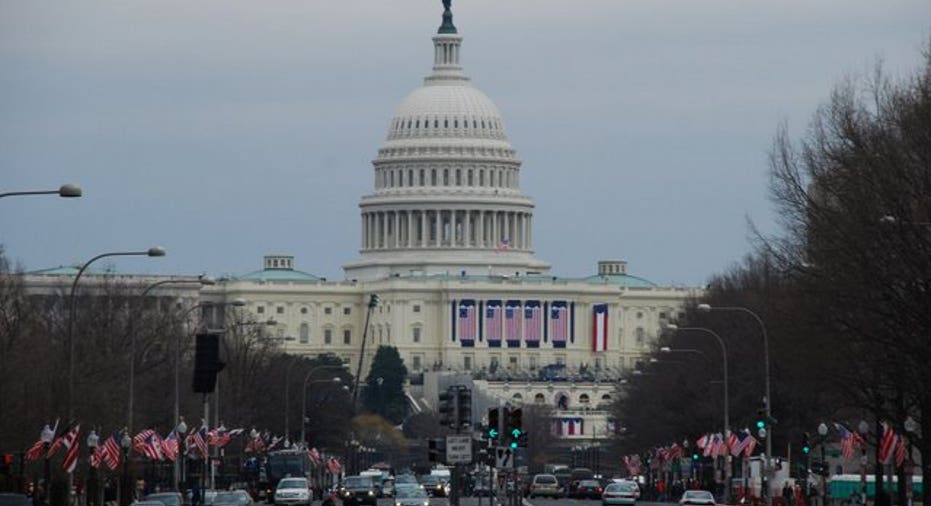Lawmakers Struggle to Strike a Deal

White House officials and Republican leaders scrambled on Sunday to reassure global markets the United States would avert a debt default, but the two sides gave no sign they were moving closer to a deal.
White House Chief of Staff Bill Daley warned that there would be a "few stressful days" ahead for financial markets, with the deadline to lift the $14.3 trillion U.S. borrowing limit now only nine days away.
Daley, appearing on the CBS television program "Face the Nation, quickly added: "In the end there's no question in my mind the government of America will not default."
But the path forward toward a deal was murky.
With Asian markets set to open in a few hours, Democrats and Republicans traded blame for the inability to strike an agreement. The two sides are deadlocked over Republicans demands for a short-term debt-limit increase that would force President Barack Obama to request further borrowing authority in early 2012.
Obama and congressional Democrats insist on a longer-term extension of the borrowing limit that would carry the country through the presidential election in November 2012.
"We're kind of at an impasse," a Senate Democratic aide told reporters.
Financial markets are growing more worried about the possibility of a debt default that could drive up interest rates, sink the dollar and send shockwaves through economies around the world. The start of the Asian trading session will give investors their first chance to react to the dramatic events in the U.S. debt-limit talks over the weekend.
On Friday, House of Representatives Speaker John Boehner walked away from private talks with the White House on long-term deficit reduction, casting doubt on whether an August 2 deadline for raising the debt limit can be met.
"I'm not sure we're looking at total mayhem yet with the Asian open, but it's possible," warned Christian Cooper, head of U.S. dollar rates derivatives at Jefferies & Co. "The next 12 hours are going to be critical."
Rating agencies say they will cut America's Triple-A credit rating if the United States fails to meet debt payments, likely triggering global market turmoil. Even if a default is avoided, the credit rating will be under pressure if Congress and the president fail to tackle long-term deficit reduction.
Global investors are still reeling from the euro zone crisis that was contained only a few days ago with the unveiling of a fresh rescue package for Greece.
Republican leaders want to show progress by 4 p.m. EDT on Sunday and have legislation to unveil on Monday.
Boehner told "Fox News Sunday" he would unveil a bipartisan deal to raise the debt ceiling. "The preferable path would be a bipartisan plan that involves all the leaders, but it is too early to decide whether that's possible," Boehner said.
"If that's not possible, I and my Republican colleagues in the House are prepared to move on our own."
The United States will run out of funds to service its debt on August 2 if Congress does not approve additional borrowing. Republicans have insisted the White House agree to deep spending cuts for long-term deficit reduction before they approve any increase in America's debt burden.
Negotiations have whipsawed for weeks, finally hitting a brick wall over taxes, one of the most ideologically divisive issues in U.S. politics.
'THEIR WAY OR THE HIGHWAY'
Daley accused House Republicans of intransigence, telling CBS' "Face the Nation" they were insisting that any deal has to be "their way or the highway."
Administration officials also said President Barack Obama would not accept a proposal for a short-term debt limit increase offered by Boehner, who told Fox there must be a "two-stage process" for raising the debt ceiling and implementing major budget reforms.
Daley and Treasury Secretary Timothy Geithner said a far-reaching "grand bargain" that would combine a debt-limit increase with a 10-year plan to cut the deficit by $4 trillion was still a possibility, despite Boehner's decision on Friday to walk away from talks on such a plan.
Boehner said his last offer to the White House on the larger deal was still on the table. That offer included some $800 billion in new tax revenue and massive spending cuts.
To pass any deal that includes more tax revenue, Boehner must overcome staunch resistance from Tea Party movement conservatives in his own party, who adamantly oppose any steps to raise taxes, fiercely defending tax cuts for the rich enacted during the administration of George W. Bush.
Macroeconomic Advisers, a forecasting firm, said that if the debt limit fight drags on, it could push the U.S. unemployment rate up to 9.6 percent by the end of the year from its current 9.2 percent rate. "Sometimes in a game of chicken, people get injured -- seriously," the firm said in a blog.
An outspoken British minister, Business Secretary Vince Cable, told the BBC that it was ironic that "the biggest threat to the world financial system comes from a few right-wing nutters in the American Congress rather than the euro zone."



















